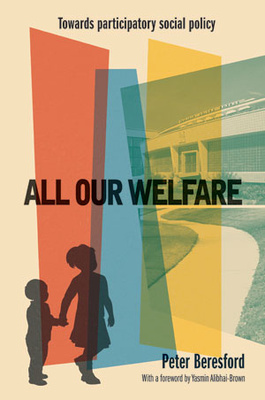As the UK welfare state comes under increased pressure, in All Our Welfare: Towards Participatory Social Policy, Peter Beresford offers a critique of its past, present and future from a participatory perspective. Drawing upon personal experience and the theories of welfare service user movements, Beresford outlines the limitations of past approaches and explores ways in which service user ideas and experiences can serve the development of a sustainable and participatory social policy. Although wishing for a more detailed vision of how the welfare state can become user-led, Ashwin Desai finds this a timely and thought-provoking read.
All Our Welfare: Towards Participatory Social Policy. Peter Beresford. Policy Press. 2016.
 We’re often told that the British welfare state was born of a real people’s revolution, with one nation, in the throngs of collectivist euphoria, rallying behind a socialist government as it refashioned its institutions. The New Jerusalem, the story goes, was indeed built here, and it survived more than thirty years in pristine condition (you might say we ‘never had it so good’), until an unfeeling Margaret Thatcher and her dastardly associates took it apart in the 1970s and 1980s.
We’re often told that the British welfare state was born of a real people’s revolution, with one nation, in the throngs of collectivist euphoria, rallying behind a socialist government as it refashioned its institutions. The New Jerusalem, the story goes, was indeed built here, and it survived more than thirty years in pristine condition (you might say we ‘never had it so good’), until an unfeeling Margaret Thatcher and her dastardly associates took it apart in the 1970s and 1980s.
For Peter Beresford, this is a hazy and romantic vision of the post-war period. Sure, the Clement Attlee government was bold, concerning itself with the biggest questions of mid-century progressive statecraft: securing full employment, social security, housing, health and education. And yes, in doing so, it really did seek to fundamentally alter the nature of British society to make it kinder and more humane.
But the ‘shandygaff’ of British centralism (to borrow Lord Woolton’s memorable language) was always fundamentally elitist and undemocratic, preferring top-down planning and formal, service-led systems to involving those whose lives it sought to improve in the policy-making process. As a result, popular support for individual services was never really enlisted, and ignorance of its workings was always high. As today, people tended to support benefits they saw themselves benefitting from, such as the NHS, and were skeptical of those catering only to other groups.
It’s this failure to really engage ‘the people’ – to speak to their experience, their ideas and their preferences – that allowed the New Right and its think tanks to so easily tie notions of paternalism and bureaucracy to state provision in the 1970s, casting themselves, with their consumerist rhetoric of choice and involvement, as defenders of the people against the patricians (153).
 Image Credit: NHS Petition Hand-In to Nick Clegg, 2011 (38 Degrees CC 2.0)
Image Credit: NHS Petition Hand-In to Nick Clegg, 2011 (38 Degrees CC 2.0)
And in a partial sense, they were right. The bureaucratic, service-led welfare state really did fail to connect with ordinary people, allowing them no role in policy-making or practice. Combine this with its inherent minimalism, which provided benefits only to meet ‘reasonable human needs’ at subsistence level, and you have a system that existed to prevent citizens from total impoverishment (and Disease, Ignorance and Idleness), only to discipline, isolate and stigmatise them.
Its crutch and cane were the ‘professional experts’, the ‘high priests’ of social policy (189), who, like their counterparts in the academy, the Fabians, produced ‘impartial’, ‘objective’, ‘scientific’ analyses of service provision, with a particular penchant for measurements, surveys and statistical studies. Neither had any direct experience of welfare. They believed that this distance made them credible analysts, mediators and architects of social policy. Instead, it disconnected them from welfare service users and elided their experiences.
Did it have to be this way? In All Our Welfare: Towards Participatory Social Policy, Beresford charts an alternative history of social and voluntary movements that instead foregrounds the lives and experiences of the ‘ordinary’ and ‘marginalised’ (173) – from the new social movements of the 1960s-80s, which made political issues of diversity and difference, challenging discrimination of all kinds and the positivism of Fabian social policy, to the service user movements, which emerged out of welfare recipients’ dissatisfaction with state support and new challenges to welfare from the New Right and radical left.
All of these movements demanded the right for people to speak for themselves, to participate in political decision-making, to have their equal worth recognised and their human and civil rights met. All likewise developed their own narratives and histories, models and theories of welfare provision. Service user research in particular challenged the gaps between social policy, its makers and the people it affects, reworking relationships between research and its participants.
If the new social and service user movements provide a guide to overcoming the epistemological inequalities and exclusions that hinder participation, for Beresford the plethora of voluntary organisations and workplace movements that emerged in the same period shows us how a new, participatory welfare state might be based around collaborative working practices. Here, he writes of everything from the Meridien (motorcyle) Co-operative and the heritage railways to the canal system and the Lucas Aerospace plan, an Alternative Plan for ‘socially useful production’ published by workers at the company in response to job cuts (263). All of these case studies suggest the possibility of new kinds of roles and relationships for people within and across organisations and between people and a participatory welfare state.
All Our Welfare is a thought-provoking book that offers a timely challenge to much contemporary academic social policy. It is enriched by the author’s personal experience of welfare. Having lived on poverty-level benefits for almost a decade and a long-term user of mental health services, Beresford brings first-hand experience of everything from benefit appeal tribunals to unemployment and training schemes. It’s a shame, then, that despite his promise to connect us with welfare service users ’in as much of their flesh and blood reality as possible’ and to foreground social policy’s day-to-day (17), one leaves this book feeling shortchanged. This is not a close reading of the lived experience of welfare. Instead, it reads like a conventional social policy textbook, with the bulk of it taken up by a remarkably brief history of British welfare provision, social movements and workplace activism over the last two centuries.
When it does attempt to formulate a model for a new kind of welfare state, it tends to skirt over the detail: we’re never told how Beresford’s welfare system would actually work, nor what services could fall under its remit. The vast majority of his models for collaborative, participatory organisation are at least two decades old, and the obvious issues with participatory governance – that it a) might be costly; b) would not provide a consistent level of service across the board; c) might be at risk of cooption by politically unpalatable groups; and d) puts the onus on individual participants, therefore penalising those with overbearing (financial, familial, etc) commitments – aren’t addressed. A more focused approach – drilling down into the past and present of a single welfare service and explaining how it might become user-led – would have been more helpful.
That’s not to say Beresford’s critique isn’t persuasive. After all, no one likes bureaucracy except (some) bureaucrats. There’s no question that the British welfare state is excessively bureaucratic and riven by a crude managerial logic. And, of course, state provision need not be this way. But in an age of mass disenfranchisement and radical, exclusionary populism, we need to think hard about how any ideal, ‘engaging’ welfare system might balance the need for transparent, equitable rules with participation, improvisation or play. As David Graeber points out in The Utopia of Rules, bureaucracy may well be cold and impersonal, but it is also (for the most part) even-handed, predictable and labour-cheap for its users. Like Beresford, we all like the sound of our states being more vibrant, flexible, personalised and people-centred. The real, boring challenge is figuring out exactly what that entails.
Ashwin Desai works at NBC Universal. A graduate of the University of Chicago and the London School of Economics, he was previously at Arise Pictures. Follow him at AADe5ai.
Note: This review gives the views of the author, and not the position of the LSE Review of Books blog, or of the London School of Economics.







